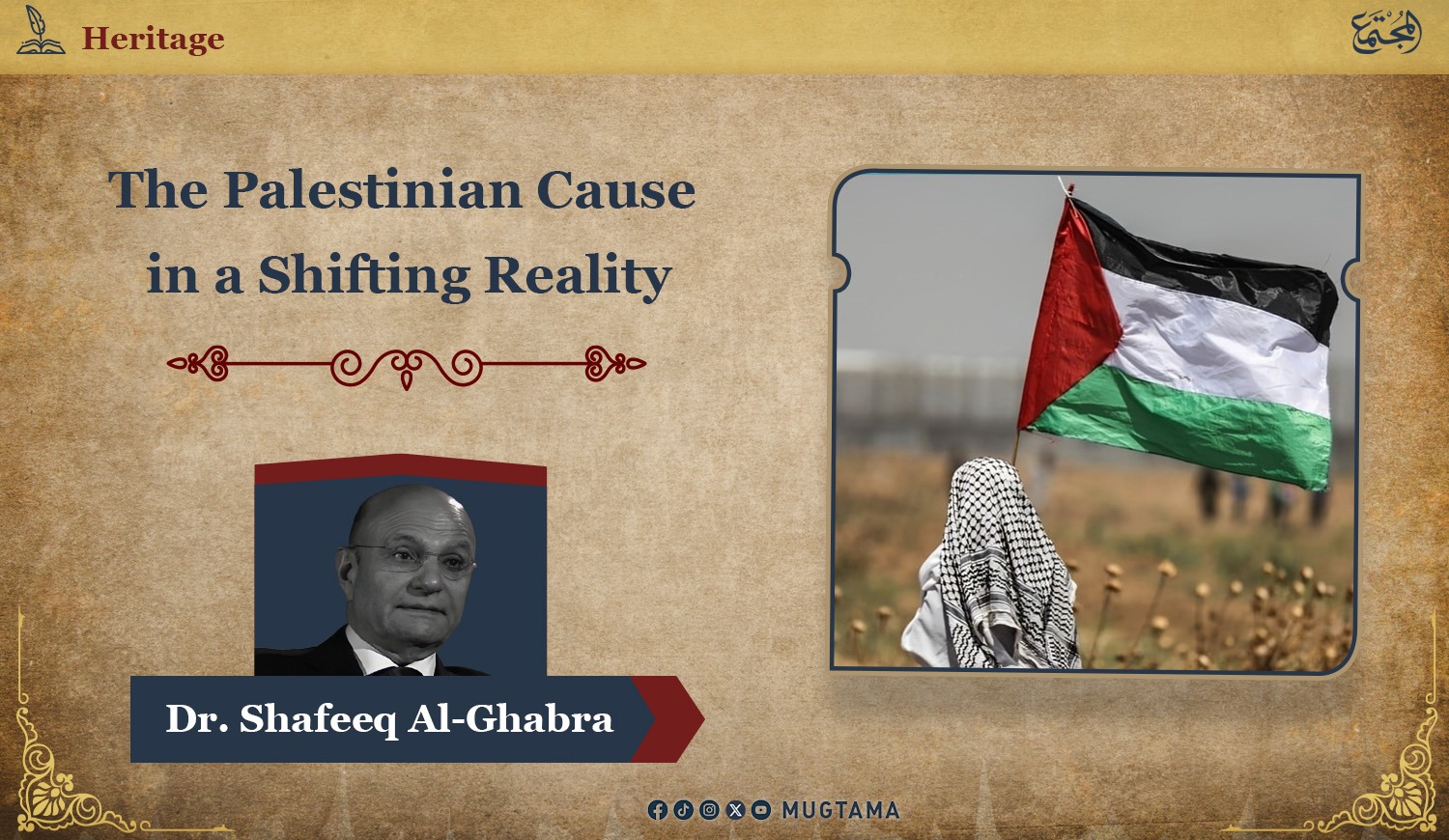The Palestinian Cause in a Shifting Reality

The occupation in Palestine continues to
exercise various forms of oppression and destruction against the Palestinian structure. Among its most blatant manifestations are
settlement expansion, the demolition of the homes of resistance fighters,
restrictions on job opportunities, and the prevention of movement across
Palestine and the West Bank. The occupation’s goal has not changed — it remains
steadfast in its effort to undermine the stability and independence of the
Palestinian population.
However, one constant feature of the
Palestinian situation is its commitment to resisting the occupation and
striving to defeat it. The Palestinian strategy is clear: holding firmly to
homes, villages, lands, and camps; defying the separation wall; and persistently
wearing down the Israeli army through a long-term struggle led by Palestinian
stone-throwers. Yet, the true long-term goal is to obtain rights, achieve
justice, and secure a dignified life — which requires ending the oppression
practiced by Israel against Palestinians. The Great March of Return and certain
bold fedayeen (freedom fighters’) operations targeting settlements — intended
to transfer instability to the settlers — are among the means of resistance.
A Mature Form of Resistance
As resistance intensifies, it becomes
evident that the Palestinian popular consciousness has matured beyond previous
stages. For this reason, it is difficult to witness an all-encompassing
intifada (uprising) across all levels under the current fragile Arab and
international circumstances. It can be concluded that Palestinian resistance is
becoming more mature and integrated, combining various methods of struggle —
including the ability to continue economic and civil activities such as
education and all aspects of Palestinian life. The current resistance faces
Israel, but it does not confront the Palestinian Authority as an authority
under occupation. While Palestinians are fully aware of the weaknesses of the
Authority, they will not allow the occupation to turn the struggle against it
into an internal Palestinian conflict.
The Deal of the Century Falters
It has also become clear that the “Deal of the Century,” which reached its
peak in recent months, is heading toward failure for several reasons. Chief
among them is that the main forces behind it — especially the White House,
Jared Kushner (Trump’s son-in-law), and other Trump representatives — are
besieged by legal and political troubles. More importantly, the White House
treated the Deal of the Century as a real estate and financial transaction — a
project of official normalization — relying on Israeli security expertise for
several Arab regimes. The deal, from the outset, ignored the people and their
rights. Its flaws were so evident that even the Palestinian Authority — known
for its flexibility in exchange for an independent Palestinian state — could
not bring itself to go along with it.
The more Israel oppresses Arab peoples,
aligns itself with Arab regimes riddled with contradictions, and offers
security services to governments that fear their own populations, the more its
own lifespan in the Middle East becomes limited.
The Deal of the Century was also rejected
by Hamas in Gaza, as well as by other Palestinian factions. The reason is
clear: the deal does not address the Palestinians’ right to a dignified life on
their land. It does not guarantee a halt to settlement expansion or Israel’s
withdrawal from all occupied territories in the West Bank. Nor does it promise
an end to the Israeli apartheid wall, the blockade of Gaza, or provide any
acceptable resolution regarding Jerusalem as Palestinian land and the capital
of a Palestinian state.
Normalization and Public Awareness
The assassination of Jamal Khashoggi inside
the Saudi consulate in Istanbul disrupted all the elements and parties involved
in the Deal of the Century. The killing damaged the special relationship
between the White House and Saudi Arabia on multiple levels, as the case became
a media and public issue, placing constraints that did not exist before. The
murder of Khashoggi led to visible tension between U.S. sovereign institutions,
Congress, and Saudi Arabia — a tension harmful to the Deal of the Century or any
other such plan, while also raising questions about the future of U.S.-Saudi
relations.
At the same time, Israel faces a deepening
dilemma due to global shifts concerning Zionism. Many Jews worldwide have begun
questioning the Zionist state, its values, and the path it has chosen. It is
therefore unsurprising that more Jews are turning against Zionism, and more
people around the world are rejecting accusations of antisemitism simply for
criticizing Israel and Zionism.
Meanwhile, several Arab states are engaging
in open normalization — politically and security-wise — with Israel, ignoring
the fact that it occupies Jerusalem, Judaizes it, and oppresses Palestinians.
Yet Arab popular consciousness takes the opposite stance. Across the Arab
world, from Lebanon to Bahrain, from Kuwait to Qatar, Egypt, Oman, Jordan, and
beyond, civil society movements tied to the Boycott, Divestment, and Sanctions
(BDS) campaign express growing opposition to normalization, both privately and
publicly. In every Arab country where even minimal expression is possible,
voices rise to criticize Arab-Israeli security coordination, which largely
serves to spy on their own citizens and opponents. All these dimensions show
that the Arab-Israeli conflict has entered the vital domain of the Arab
political system itself.
No Stability Without Justice
It is indeed true that stability is
impossible without a just solution to the Palestinian issue. After more than
seventy years since the Nakba, Israel remains anxious about its future —
despite normalization with several Arab states. Despite diplomatic relations
with Egypt and Jordan, and even security normalization with others, Israel’s
future outlook remains uncertain — due to the extremism of its project, the
rise of radicals within its entity, and its opposition to Arab liberation.
The equation is clear: the more Israel
oppresses Arab peoples, aligns itself with contradictory Arab regimes, and
provides security services to governments fearing their own citizens, the more
its lifespan in the Middle East diminishes. There can be no security without
justice, without values, and without ethics — for greed is the root of
oppression, and oppression is the foundation of perpetual rebellion.
-------------------------------------------------------------
Read Also:
-
Gaza Deal Crowns Palestinian Resilience and Breaks Israeli Arrogance











